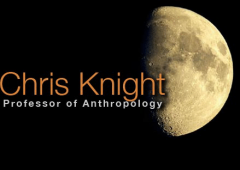Chris Knight
From Approaches to the Evolution of Language, ed James R Hurford, Michael Studdert-Kennedy & Chris Knight.
1998. Cambridge University Press, Cambridge UK, ISBN 0 521 63964 6. 1998
1 Introduction: the Darwinian paradigm
Darwinism is setting a new research agenda across the related fields of palaeoanthropology, evolutionary psychology and theoretical linguistics (Dunbar 1993; Hurford 1989, 1992; Pinker & Bloom 1990; Steele & Shennan 1996). It is now widely accepted that no other theoretical framework has equivalent potential to solve the major outstanding problems in human origins research. Rival paradigms from the human and social sciences — Freudian, Piagetian, Chomskyan, Lévi-Straussian — cannot explain evolved human mentality because they already assume this as a basic premise. Tried and tested as a methodology applicable to the social behaviour of all living organisms (Dawkins 1976; Hamilton 1964; Trivers 1985), Darwinism makes no such assumptions, thereby avoiding circularity.
Modern Darwinism seeks to harmonize research into human life with the rest of scientific knowledge. This project depends, however, on accounting for the emergence of symbolic culture, including speech, a system of communication unparalleled elsewhere in biology. While Darwinians confidently expect an explanation (Pinker & Bloom 1990), it has to be admitted that, to date, no compelling account has been advanced.
Continue reading “Ritual/speech coevolution: a solution to the problem of deception”
